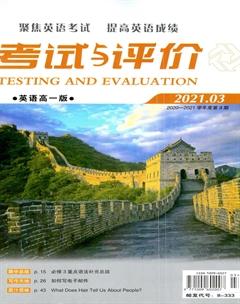原因状语从句要点归纳
古光英
考测题
I. 用because, since, as或for填空。
1. ___ you are tired, you should have a rest.
2. I got the job ___ the people who run the firm knew I had already written some programmes.
3. ___ the ticket price was low, most of the time Ocean Park was operating under deficit (亏损).
4. The meeting must have been put off, ___ I saw nobody when I went to the meeting room.
5. The children have to teach each other ___ the teacher is busy with other work.
6. He could not have seen me, ___ I was not there.
7. ___ it can take a long time to download large image files, keep the file sizes small.
II. 从所给的四个选项中选出最佳选项。
1. ___ hes ill, hes unlikely to come.
A. Although B. Seeing that
C. When D. Until
2. ___ you are grown up, you should not depend on your parents.
A. While B. Now
C. As soon as D. Unless
3. My book is different from yours ___ mine is about chemistry while yours is about history.
A. in that B. though
C. if D. once
4. ___ it is raining outside, you should not leave.
A. Consider that
B. Being considering that
C. Considering that
D. Considered that
5. —Why did the factory turn to the German engineer for help?
—___ no workers could repair the machine.
A. For B. As C. Since D. Because
III. 根据汉语意思完成下列句子,每空词数不限。
1. 手机联系方便,所以很多父母给他们的孩子购买手机。
Because mobile phone owners can be reached at any time, _______ for their children.
2. 你不要因为有人说你坏话而生气。
You shouldnt get angry _______.
3. 因为水已经被污染了,所以村民们已经没有水可喝了。
The villagers have no water to drink _______.
The villagers have no water to drink _______.
(Key?p. 37)
归纳讲解
一、原因状语从句的引导词
引导原因状语从句的从属连词主要有because, as, since, for, seeing (that), now (that), considering (that), in that等。
(一) because, since, as和for的区别
because引导的原因状语从句一般位于主句之后,because表示直接的原因,语气最强,从句是全句表达的中心,也用来回答由 why引导的特殊疑問句;since引导的原因状语从句一般位于主句之前,表示已知的事实,通常被翻译成“既然”,较为正式,语气比because弱;as 引导原因状语从句时表示附带说明的双方已知的事实或比较明显的原因,语气比since弱,较为口语化,位置较为灵活,常与since换用;for引导的原因状语从句并不说明主句行为发生的直接原因,只提供一些辅助性的补充说明或推断原因,for引导的原因状语从句只能位于主句之后,并且必须用逗号将其与主句隔开。例如:
He didnt attend the meeting yesterday because he was ill. 他昨天没来开会是因为生病了。(he was ill是他没来开会的直接原因,也是全句表达的中心。)
Since you are free today, you should help me with my mathematics. 既然你今天有空,你应该帮我补习数学。(you are free是附带说明的事实,着重点在主句。)
As it is raining, you should take a taxi. 既然在下雨,你应该乘出租车。(it is raining是附带说明的原因,不过其语气比since要弱,着重点也在主句。)
He must be ill, for he is absent today. 他今天没来,一定是生病了。(主句he must be ill是从he is absent today推断出来的,它们之间不存在因果关系。)
再如考测题的第I题,第2、5小题表示的是直接原因,所以用because;第1、3、7小题为比较明显的原因或双方已知的事实,故使用since或as,当场合比较正式时,使用since更佳,如第3题;第4、6小题表示推测的依据,故填for;还有第II题的第5小题,回答由why引导的特殊疑问句用because。
(二) seeing (that), now (that), considering (that), in that这几个从属连词与since引导的原因状语从句意思相近,都表示“既然”。例如:
Seeing that it is 8 oclock, well wait no longer. 由于已经八点了,我们就不再等了。
Now (that) he refused to help us, theres no reason that we should now help him. 他既然曾经拒绝帮助我们,我们现在也没有理由要帮助他。
Considering (that) everybody is here, lets begin our discussion. 既然大家都到了,我们就开始讨论吧。
In that he is ill, he feels unable to do it. 因为生病了,他觉得做不了那件事。
二、几点注意事项
(一) because, since, as, for等这些引导原因状语从句的连词不能与so连用。虽然在汉语中习惯上说“因为……,所以……”,但英语习惯并非如此,尤其在使用because 的时候要更加注意。例如:
I didnt enjoy the picnic because the weather was bad. 我不喜欢那次野餐,因为天气不好。
再如,在做第III题的第1小题时,千万不可因为原句中有“所以”就直接译为so,因为在句子的开头已经使用了because。
(二) 关于not... because...结构:该结构中的否定词有时否定主句,有时否定从句,一般要根据句子的意思作出正确或合乎逻辑的理解。若not否定主句,最好在because之前用逗号,否则会引起歧义,如下面的句子在没有特定上下文时就有两种解释:
I didnt go because I was afraid. 我没有去是因为害怕。(也可以理解为“我不是因为害怕才去的”。)
再如,在做第III题的第2小题时一定要把否定词not放在主句,而非从句中。
(三) because引导的原因状语从句有时可与because of 短语转换。例如:
He cant come because he is ill. = He cant come because of his illness. 他因病不能来。
I said nothing about it because his wife was there. = I said nothing about it because of his wifes being there. 因為他妻子在那儿,我对此事只字未提。
再如,第III题的第3小题就有两种翻译方法。

